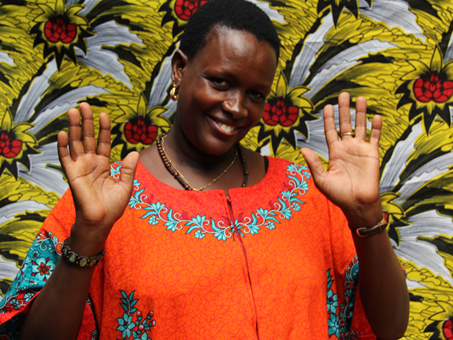Support 170 women get the HIV treatment, care, and support they need to stay healthy and the training and skills to help them build a bright future.
Why we care: Uganda is experiencing an increase in new HIV infections—half of the 1.4 million people living with HIV in the country are women, many of who live in poverty.
How we’re solving this: We provide comprehensive HIV treatment and care and access to peer support, skills training, and income to women living with HIV.
Keep a Child Alive supports Alive Medical Services (AMS), a community-owned clinic in Namuwongo, one of the poorest and most crowded urban areas in Kampala, Uganda. AMS was truly born out of a grassroots movement: Dr. Pasquine Ogunsanya saw women in her community who weren’t getting the HIV treatment and care they needed to stay alive, live with dignity, and care for their families—and decided to do something about it. Today, the AMS clinic provides comprehensive HIV treatment and care services to 11,000 people living with HIV, the majority of whom are women.
Among them are the women of Tweyambe Group (‘let’s help ourselves’ in Luganda, a local language). Tweyambe was founded when seven clinic clients came together to talk about their experiences as women living with HIV, offer support to each other, and start a small loan program. Nearly a decade later, Tweyambe is now 170 members strong, offering its members:
- Emotional and adherence support
- Access to income-generating activities, such as making and selling baskets and beaded jewelry
- Training and mentoring in sewing and tailoring, leadership skills, record keeping, and counseling
- Group savings and micro-loan programs so women can have the capital to start their own small businesses
This project will help the clinic purchase medicines and supplies (such as antiretroviral medications when the free government stocks run low, antibiotics to prevent and treat infections common among women living with HIV, medicines to treat other illnesses, and laboratory supplies and tests); cover a portion of clinical and psychosocial support staff salaries; ensure that Tweyambe has space to hold support group meetings and trainings for members; and provide basic materials for Tweyambe members to make and then sell handicrafts.
By supporting this project, you will provide the women of Tweyambe the promise of life for themselves and their children. In the words of Florence, Tweyambe’s Chairwoman, “here, you know you are loved, you are somebody, your dignity is restored.”


